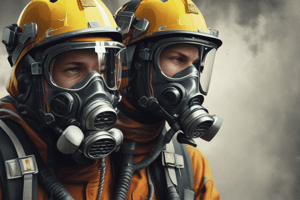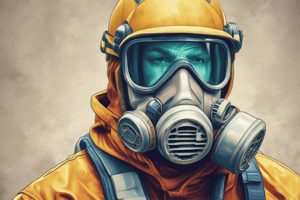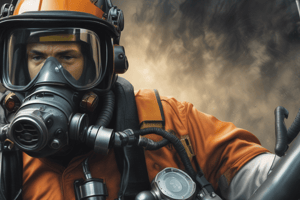Podcast
Questions and Answers
What is the responsibility of supervisors regarding respiratory protection equipment?
What is the responsibility of supervisors regarding respiratory protection equipment?
- Wearing issued respiratory protection
- Completing maintenance and repairs of respiratory equipment
- Ensuring subordinates comply with respiratory protection requirements (correct)
- Testing and monitoring work areas for inhalation hazards
How often is fit testing required for respiratory protection equipment?
How often is fit testing required for respiratory protection equipment?
- Once a year (correct)
- Once every 6 months
- Once every 2 years
- Only when physical changes affect fit
When is respiratory protection equipment required to be used?
When is respiratory protection equipment required to be used?
- During daily inspection and cleaning of equipment
- During incidents with potential respiratory exposure (correct)
- Only during fire extinguishment
- Only during overhaul phase
Who is responsible for maintenance and repairs of respiratory equipment?
Who is responsible for maintenance and repairs of respiratory equipment?
How often are SCBA Air-Paks required to be inspected and tested?
How often are SCBA Air-Paks required to be inspected and tested?
Who can fill SCBA cylinders with breathing air?
Who can fill SCBA cylinders with breathing air?
How often must steel cylinders storing breathing air be replaced?
How often must steel cylinders storing breathing air be replaced?
Who is responsible for ensuring that each inspection record corresponds to the breathing apparatus carried on respective apparatus?
Who is responsible for ensuring that each inspection record corresponds to the breathing apparatus carried on respective apparatus?
Who is responsible for ensuring that subordinates comply with respiratory protection requirements?
Who is responsible for ensuring that subordinates comply with respiratory protection requirements?
When is it necessary to use respiratory protection equipment?
When is it necessary to use respiratory protection equipment?
Who is responsible for maintaining and repairing respiratory equipment?
Who is responsible for maintaining and repairing respiratory equipment?
What is the responsibility of supervisors regarding respiratory protection equipment?
What is the responsibility of supervisors regarding respiratory protection equipment?
When is fit testing required for FRD personnel using respirators?
When is fit testing required for FRD personnel using respirators?
How often must steel cylinders storing breathing air be replaced?
How often must steel cylinders storing breathing air be replaced?
Who maintains the records of assignment, repair, and replacement of SCBA, cylinders, hydrostatic test dates, etc.?
Who maintains the records of assignment, repair, and replacement of SCBA, cylinders, hydrostatic test dates, etc.?
What is the responsibility of the program administrator regarding the Respiratory Protection Program?
What is the responsibility of the program administrator regarding the Respiratory Protection Program?
What is the responsibility of supervisors in the Respiratory Protection Program?
What is the responsibility of supervisors in the Respiratory Protection Program?
When is respiratory protection required during firefighting?
When is respiratory protection required during firefighting?
How often must breathing air compressors be tested and maintained?
How often must breathing air compressors be tested and maintained?
What is the responsibility of the program administrator in the Respiratory Protection Program?
What is the responsibility of the program administrator in the Respiratory Protection Program?
Flashcards are hidden until you start studying
Study Notes
Respiratory Protection Equipment and Maintenance Procedures
-
Supervisors are responsible for ensuring subordinates comply with respiratory protection requirements, including training, fit testing, and monitoring work areas for inhalation hazards.
-
Employees must wear issued respiratory protection and inform supervisors of any challenges with equipment.
-
FRD personnel using respirators must undergo a medical examination and respiratory clearance assessment.
-
Fit testing is required annually and before respiratory protection use or if physical changes affect fit.
-
Respirator use is required during incidents with potential respiratory exposure and daily inspection and cleaning of equipment is necessary.
-
The overhaul phase after fire extinguishment requires continued use of SCBA until the area is no longer an IDLH. Respiratory protection may be downgraded during further overhaul phases.
-
Maintenance and repairs of respiratory equipment must be completed by factory-trained technicians.
-
Annual inspection and testing of SCBA Air-Paks are required and any malfunctioning equipment must be sent to the air shop for evaluation and testing.
-
Breathing air compressors must be tested and maintained according to regulations and only trained personnel can fill SCBA cylinders.
-
Steel cylinders storing breathing air must be replaced semi-annually and purged on the first day of each month.
-
Appropriate PPE, caution, and safety measures must be taken during compressed air operations and when working on elevated surfaces.
-
All FRD-provided respiratory equipment must be stored in issued storage bags and SCBA units must be stored on the apparatus in the proper configuration.Respiratory Protection Program Documentation and Recordkeeping Guidelines
-
The Respiratory Protection Program requires continuous evaluation and enhancement based on end user feedback.
-
Medical evaluation records related to the use of respirators are maintained in accordance with 29 CFR 1910.1020.
-
Each SCBA requires an inspection record, and all field inspections, cleaning, and disinfecting must be recorded on the fire station's SCBA Field Inspection Record.
-
The fire station copy of the FRD-036 must be retained for one year and then discarded, while the air shop maintains all records of assignment, repair, and replacement of SCBA, cylinders, hydrostatic test dates, etc.
-
Fire station commanders are responsible for ensuring that each inspection record corresponds to the breathing apparatus carried on respective apparatus.
-
The department maintains a record of each fit factor result per 29 CFR 1910.1027, Appendix C I A 12 (Cadmium Standard), and the fit test record must be maintained until the next fit test is administered.
-
Fit test records are maintained by the PSOHC.
-
Maintenance records for necessary repairs and calibrations of each Portacount Plus© instrument must be kept by the air shop.
-
The Respiratory Protection Program requires training on proper donning, doffing, and storage of respirators.
-
The program also provides guidance on recognizing medical symptoms that may compromise the safety of the wearer.
-
The program administrator is responsible for ensuring the effectiveness of the Respiratory Protection Program and recommending enhancements based on end user feedback.
-
The program requires documentation and recordkeeping to ensure compliance with relevant regulations.
Respiratory Protection Equipment and Maintenance Procedures
-
Supervisors are responsible for ensuring subordinates comply with respiratory protection requirements, including training, fit testing, and monitoring work areas for inhalation hazards.
-
Employees must wear issued respiratory protection and inform supervisors of any challenges with equipment.
-
FRD personnel using respirators must undergo a medical examination and respiratory clearance assessment.
-
Fit testing is required annually and before respiratory protection use or if physical changes affect fit.
-
Respirator use is required during incidents with potential respiratory exposure and daily inspection and cleaning of equipment is necessary.
-
The overhaul phase after fire extinguishment requires continued use of SCBA until the area is no longer an IDLH. Respiratory protection may be downgraded during further overhaul phases.
-
Maintenance and repairs of respiratory equipment must be completed by factory-trained technicians.
-
Annual inspection and testing of SCBA Air-Paks are required and any malfunctioning equipment must be sent to the air shop for evaluation and testing.
-
Breathing air compressors must be tested and maintained according to regulations and only trained personnel can fill SCBA cylinders.
-
Steel cylinders storing breathing air must be replaced semi-annually and purged on the first day of each month.
-
Appropriate PPE, caution, and safety measures must be taken during compressed air operations and when working on elevated surfaces.
-
All FRD-provided respiratory equipment must be stored in issued storage bags and SCBA units must be stored on the apparatus in the proper configuration.Respiratory Protection Program Documentation and Recordkeeping Guidelines
-
The Respiratory Protection Program requires continuous evaluation and enhancement based on end user feedback.
-
Medical evaluation records related to the use of respirators are maintained in accordance with 29 CFR 1910.1020.
-
Each SCBA requires an inspection record, and all field inspections, cleaning, and disinfecting must be recorded on the fire station's SCBA Field Inspection Record.
-
The fire station copy of the FRD-036 must be retained for one year and then discarded, while the air shop maintains all records of assignment, repair, and replacement of SCBA, cylinders, hydrostatic test dates, etc.
-
Fire station commanders are responsible for ensuring that each inspection record corresponds to the breathing apparatus carried on respective apparatus.
-
The department maintains a record of each fit factor result per 29 CFR 1910.1027, Appendix C I A 12 (Cadmium Standard), and the fit test record must be maintained until the next fit test is administered.
-
Fit test records are maintained by the PSOHC.
-
Maintenance records for necessary repairs and calibrations of each Portacount Plus© instrument must be kept by the air shop.
-
The Respiratory Protection Program requires training on proper donning, doffing, and storage of respirators.
-
The program also provides guidance on recognizing medical symptoms that may compromise the safety of the wearer.
-
The program administrator is responsible for ensuring the effectiveness of the Respiratory Protection Program and recommending enhancements based on end user feedback.
-
The program requires documentation and recordkeeping to ensure compliance with relevant regulations.
Respiratory Protection Equipment and Maintenance Procedures
-
Supervisors are responsible for ensuring subordinates comply with respiratory protection requirements, including training, fit testing, and monitoring work areas for inhalation hazards.
-
Employees must wear issued respiratory protection and inform supervisors of any challenges with equipment.
-
FRD personnel using respirators must undergo a medical examination and respiratory clearance assessment.
-
Fit testing is required annually and before respiratory protection use or if physical changes affect fit.
-
Respirator use is required during incidents with potential respiratory exposure and daily inspection and cleaning of equipment is necessary.
-
The overhaul phase after fire extinguishment requires continued use of SCBA until the area is no longer an IDLH. Respiratory protection may be downgraded during further overhaul phases.
-
Maintenance and repairs of respiratory equipment must be completed by factory-trained technicians.
-
Annual inspection and testing of SCBA Air-Paks are required and any malfunctioning equipment must be sent to the air shop for evaluation and testing.
-
Breathing air compressors must be tested and maintained according to regulations and only trained personnel can fill SCBA cylinders.
-
Steel cylinders storing breathing air must be replaced semi-annually and purged on the first day of each month.
-
Appropriate PPE, caution, and safety measures must be taken during compressed air operations and when working on elevated surfaces.
-
All FRD-provided respiratory equipment must be stored in issued storage bags and SCBA units must be stored on the apparatus in the proper configuration.Respiratory Protection Program Documentation and Recordkeeping Guidelines
-
The Respiratory Protection Program requires continuous evaluation and enhancement based on end user feedback.
-
Medical evaluation records related to the use of respirators are maintained in accordance with 29 CFR 1910.1020.
-
Each SCBA requires an inspection record, and all field inspections, cleaning, and disinfecting must be recorded on the fire station's SCBA Field Inspection Record.
-
The fire station copy of the FRD-036 must be retained for one year and then discarded, while the air shop maintains all records of assignment, repair, and replacement of SCBA, cylinders, hydrostatic test dates, etc.
-
Fire station commanders are responsible for ensuring that each inspection record corresponds to the breathing apparatus carried on respective apparatus.
-
The department maintains a record of each fit factor result per 29 CFR 1910.1027, Appendix C I A 12 (Cadmium Standard), and the fit test record must be maintained until the next fit test is administered.
-
Fit test records are maintained by the PSOHC.
-
Maintenance records for necessary repairs and calibrations of each Portacount Plus© instrument must be kept by the air shop.
-
The Respiratory Protection Program requires training on proper donning, doffing, and storage of respirators.
-
The program also provides guidance on recognizing medical symptoms that may compromise the safety of the wearer.
-
The program administrator is responsible for ensuring the effectiveness of the Respiratory Protection Program and recommending enhancements based on end user feedback.
-
The program requires documentation and recordkeeping to ensure compliance with relevant regulations.
Respiratory Protection Equipment and Maintenance Procedures
-
Supervisors are responsible for ensuring subordinates comply with respiratory protection requirements, including training, fit testing, and monitoring work areas for inhalation hazards.
-
Employees must wear issued respiratory protection and inform supervisors of any challenges with equipment.
-
FRD personnel using respirators must undergo a medical examination and respiratory clearance assessment.
-
Fit testing is required annually and before respiratory protection use or if physical changes affect fit.
-
Respirator use is required during incidents with potential respiratory exposure and daily inspection and cleaning of equipment is necessary.
-
The overhaul phase after fire extinguishment requires continued use of SCBA until the area is no longer an IDLH. Respiratory protection may be downgraded during further overhaul phases.
-
Maintenance and repairs of respiratory equipment must be completed by factory-trained technicians.
-
Annual inspection and testing of SCBA Air-Paks are required and any malfunctioning equipment must be sent to the air shop for evaluation and testing.
-
Breathing air compressors must be tested and maintained according to regulations and only trained personnel can fill SCBA cylinders.
-
Steel cylinders storing breathing air must be replaced semi-annually and purged on the first day of each month.
-
Appropriate PPE, caution, and safety measures must be taken during compressed air operations and when working on elevated surfaces.
-
All FRD-provided respiratory equipment must be stored in issued storage bags and SCBA units must be stored on the apparatus in the proper configuration.Respiratory Protection Program Documentation and Recordkeeping Guidelines
-
The Respiratory Protection Program requires continuous evaluation and enhancement based on end user feedback.
-
Medical evaluation records related to the use of respirators are maintained in accordance with 29 CFR 1910.1020.
-
Each SCBA requires an inspection record, and all field inspections, cleaning, and disinfecting must be recorded on the fire station's SCBA Field Inspection Record.
-
The fire station copy of the FRD-036 must be retained for one year and then discarded, while the air shop maintains all records of assignment, repair, and replacement of SCBA, cylinders, hydrostatic test dates, etc.
-
Fire station commanders are responsible for ensuring that each inspection record corresponds to the breathing apparatus carried on respective apparatus.
-
The department maintains a record of each fit factor result per 29 CFR 1910.1027, Appendix C I A 12 (Cadmium Standard), and the fit test record must be maintained until the next fit test is administered.
-
Fit test records are maintained by the PSOHC.
-
Maintenance records for necessary repairs and calibrations of each Portacount Plus© instrument must be kept by the air shop.
-
The Respiratory Protection Program requires training on proper donning, doffing, and storage of respirators.
-
The program also provides guidance on recognizing medical symptoms that may compromise the safety of the wearer.
-
The program administrator is responsible for ensuring the effectiveness of the Respiratory Protection Program and recommending enhancements based on end user feedback.
-
The program requires documentation and recordkeeping to ensure compliance with relevant regulations.
Studying That Suits You
Use AI to generate personalized quizzes and flashcards to suit your learning preferences.




